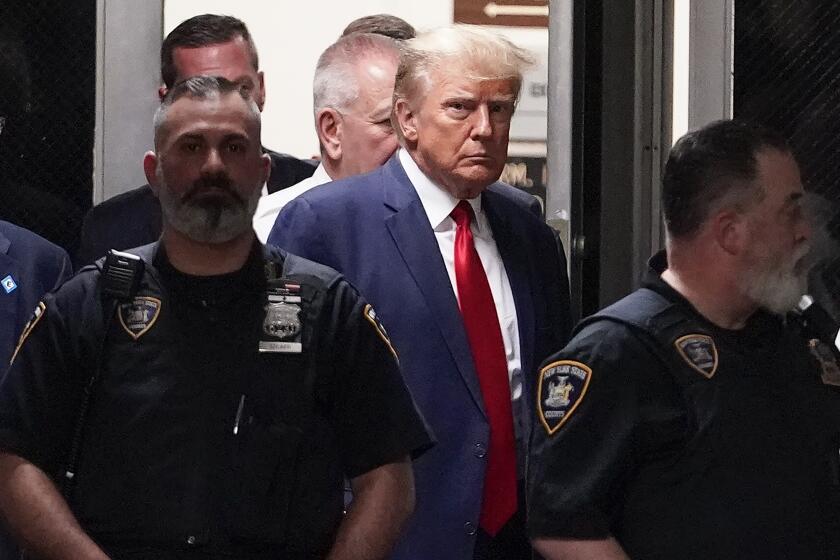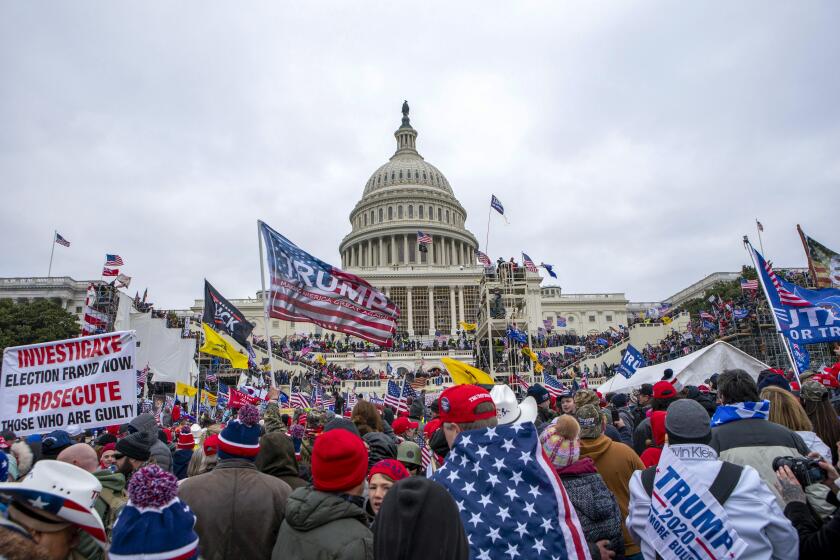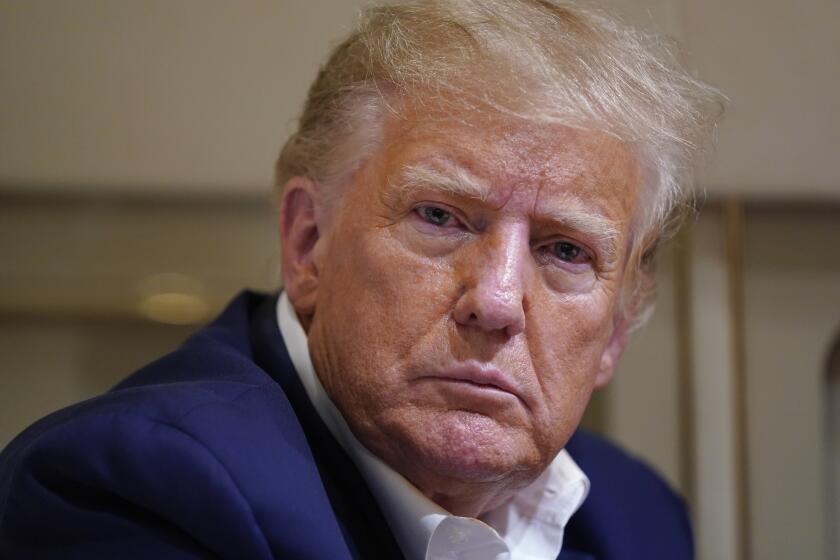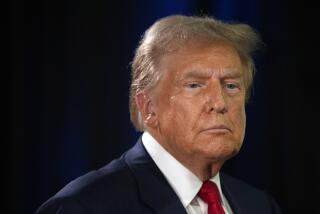What makes the Georgia indictment of Donald Trump so different from all the others
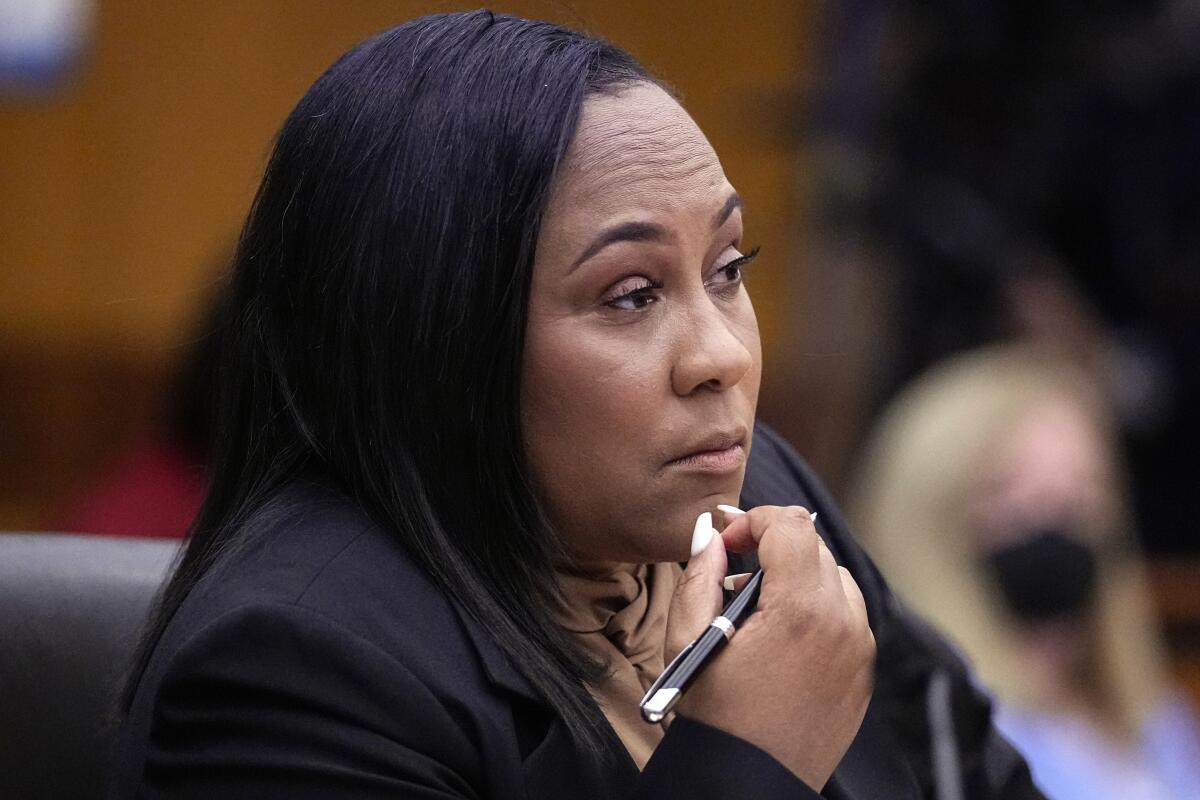
- Share via
The indictment that Fulton County Dist. Atty. Fani Willis unveiled Monday night offers a panoramic recapitulation of the misdeeds that former President Trump and his confederates allegedly perpetrated to unlawfully retain power in the months after the 2020 election. Its core charge against Trump and 18 other defendants is a violation of Georgia’s version of the Racketeer Influenced and Corrupt Organizations Act, or RICO, traditionally used to prosecute organized crime.
About half the indictment consists of a recitation of 161 overt acts in furtherance of the RICO violation, 40 of which are crimes in themselves. It covers much of what we learned from the House Jan. 6 committee and Trump’s federal indictment on charges of attempting to overturn the 2020 election, adding details such as those concerning a plot to infiltrate voting systems in rural Coffee County.
Notwithstanding that it covers plenty of familiar ground, Trump’s fourth indictment in four months is something new in the effort to hold the former president accountable. It is in many ways the most aggressive prosecutorial response to this shameful chapter of our history.
Trump’s free speech rights don’t shield him from prosecution for allegedly trying to overturn the 2020 election results. The issue is his actions, not his words.
The RICO law permitted Willis to pack a Georgia indictment with much of Trump and company’s nationwide scheme to steal the election, which extended to five other states. Under the capacious structure of the statute, it alleges that the 19 defendants participated in a criminal enterprise to keep Trump in power beyond his elected term.
If that sounds amorphous, it’s because it is, as RICO’s critics have long argued. But prosecutors can satisfy the RICO charge by proving just two of the 40 other crimes alleged, something that isn’t likely to be a heavy lift.
One of the most important differences between the Fulton County indictment and the federal case is its inclusion of 18 defendants in addition to Trump. These alleged criminals run the gamut from what Mike Pence called the “gaggle of crackpot lawyers” who surrounded and abetted Trump — Rudy Giuliani, John Eastman and the others who special counsel Jack Smith listed as unnamed co-conspirators — to lesser-known Georgia players who took part in more provincial aspects of the plot. Whereas Smith’s Jan. 6 indictment was an arrow aimed straight at Trump, Willis’ is a blunderbuss.
The profusion of defendants has several implications. Perhaps most important, it pressures them to cooperate against the other defendants, especially Trump. That’s particularly true because it’s a state rather than a federal case, which means anyone convicted can’t hope for a pardon from Trump or another Republican president.
Special counsel Jack Smith’s investigation yielded an indictment of the former president for his role in events surrounding the Jan. 6, 2021, Capitol riot.
The crowd of alleged accomplices could constitute a giant step forward in the pursuit of accountability. Just as Watergate culminated with the imprisonment of several of “the president’s men,” justice for Trump’s outrages must extend to the brazen lawlessness of those who enabled and executed his schemes.
The crowd of defendants also presents colossal logistical problems for the Fulton County system. Willis said during her brief remarks Monday night that she wants to try all of them together. But the prospect of a 19–defendant trial that includes a former president is more than a challenge; it’s close to unfathomable. We have to expect that the number will narrow as defendants choose to cooperate and are divided into more manageable groups.
Another remarkable feature of the indictment is that most of the charged conduct was also in violation of federal law and perpetrated by a president and his allies during his term. That is in stark contrast with Manhattan Dist. Atty. Alvin Bragg’s case, which concerns violations of New York law mostly before Trump took office.
Trump’s superpower is his ability to survive scandals and criminal allegations that would kill off mere mortals. The danger is voters growing numb to his serial indictments.
That poses one legal and one policy quandary. First, Trump can and surely will argue that the case should be transferred to federal court because it concerns official conduct he undertook as president. Willis will likely respond by arguing that Trump’s alleged crimes fell outside the parameters of his official duties.
Willis’ argument should probably prevail, as it has in other matters concerning Trump’s very unpresidential post-election conduct. But if it doesn’t, prosecutors from Willis’ office could be forced to try the case in an unfamiliar federal court, with a federal jury pool and according to federal procedures.
The policy point is that however righteous Willis’ case might be, and however overwhelming the evidence she has marshaled, it raises legitimate questions about local prosecution of a former president. That’s the line that Sen. Lindsey Graham (R-S.C.) immediately took, asking on Fox News, “Are we going to let county prosecutors start prosecuting the president of the United States, the former president of the United States? You open up Pandora’s box.”
Former President Trump was indicted on charges related to classified documents found at his Florida estate. Special counsel Jack Smith’s case is historic.
Trump’s latest indictment is also distinct from the others by virtue of the government-friendly laws that will apply at trial. Those begin with RICO, the Georgia version of which is unusually expansive, encompassing predicate acts such as perjury that are not included in its federal counterpart.
Georgia also has stricter laws governing the conditions of release that lean toward pretrial detention, including a requirement that defendants show they pose no risk of intimidation to witnesses. Given Trump’s history, imagine the challenge that presents for his lawyers when he is arraigned, probably later this month.
Georgia also has strong speedy-trial provisions that could allow another defendant to demand to be tried within a few months, which could put Trump in a tight spot.
Even as it repackages much familiar evidence and treads some of the ground covered by another prosecution, Trump’s fourth indictment is a lot more than piling on. In some respects, it is the most far-reaching and portentous response to Trump’s assault on democracy.
Harry Litman is the host of the “Talking Feds” podcast. @harrylitman
More to Read
A cure for the common opinion
Get thought-provoking perspectives with our weekly newsletter.
You may occasionally receive promotional content from the Los Angeles Times.
